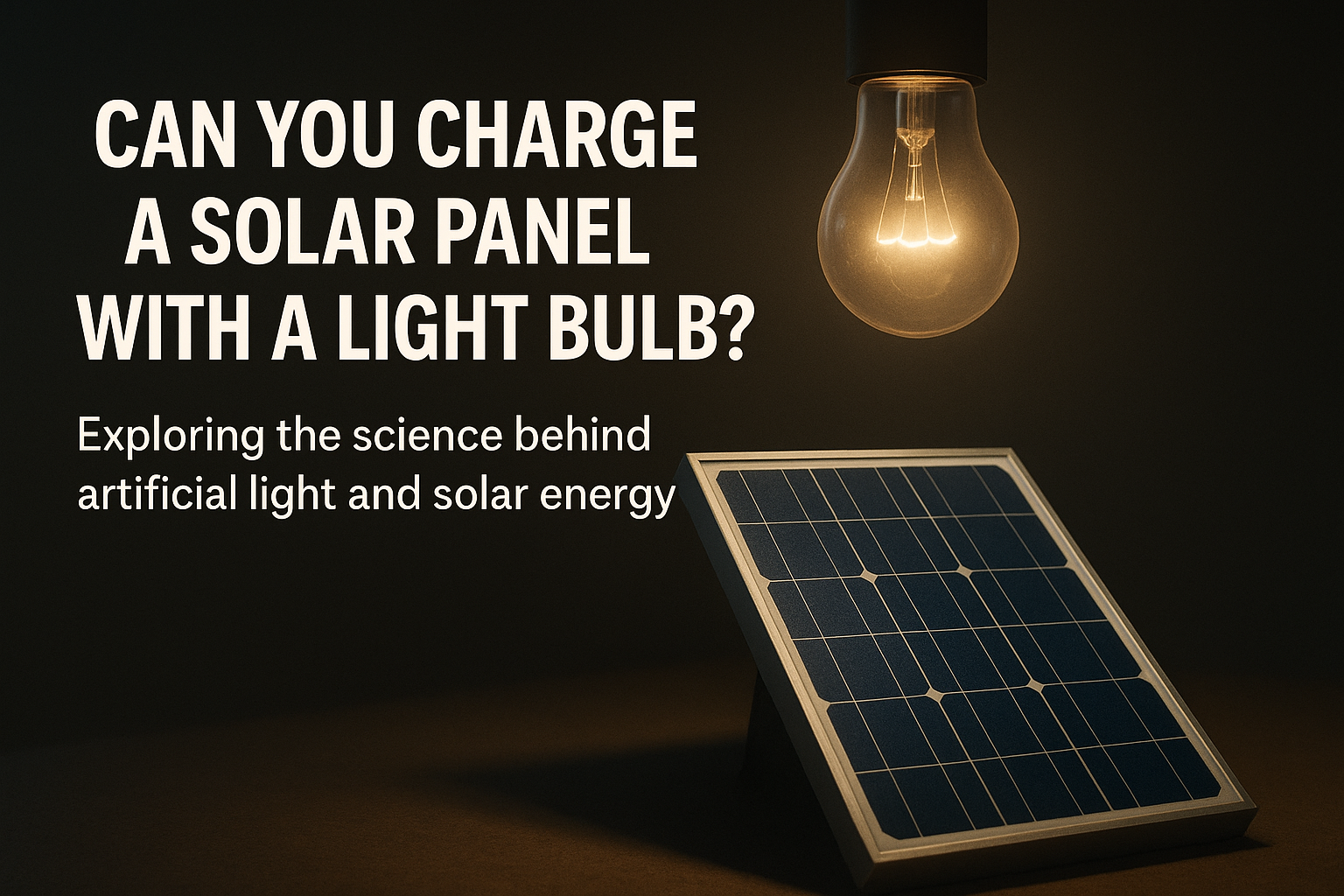Can a Light Bulb Charge a Solar Panel? Exploring the Science and Practicality in 2025

In the quest for sustainable energy solutions, a common question arises: Can artificial light sources, like light bulbs, effectively charge solar panels? This article delves into the science behind this concept, evaluating its feasibility and practicality in 2025
Ever wondered if you could give your solar panel a boost when the sun isn’t shining? While sunlight remains the primary source of energy for solar panels, charging a solar panel with a light bulb is possible under certain circumstances.
Let’s explore the science behind this concept and explore its practical applications.
Understanding Solar Panels and Light Bulbs
Solar panels are devices that convert sunlight into electricity using a technology called the photovoltaic effect. They are made up of photovoltaic cells, which contain materials that absorb specific light wavelengths, triggering the flow of electricity.
Light bulbs, on the other hand, work oppositely. They convert electrical energy into light energy, emitting photons illuminate our surroundings.
Understanding Solar Panels
Solar panels are designed to absorb the specific wavelengths of light present in sunlight. However, they can also respond to similar wavelengths emitted by certain artificial light sources like light bulbs.
Solar panels have small cells made of silicon. When sunlight hits these cells, they create electricity. This is called the photovoltaic effect. Sunlight is strong and has the right light (UV and infrared) to power solar panels.
Understanding Light Bulbs
The effectiveness of a light bulb for charging a solar panel depends on its spectral output, meaning the range of wavelengths it emits.

Light bulbs like incandescent bulbs, which emit a broader spectrum closer to sunlight, can potentially charge solar panels to some extent. However, other types, like LEDS, with a narrower spectrum, are less effective.
The Science Behind Charging Solar Panels with Artificial Light
The answer is YES, but with limitations. While light bulbs can provide some charge to solar panels, the efficiency is significantly lower compared to sunlight. This is due to several factors:
- Energy conversion losses: Converting electricity to light and then back to electricity in the solar panel results in significant energy loss.
- Spectral mismatch: Light bulbs don’t perfectly replicate the sun’s light spectrum, limiting the amount of usable energy absorbed by the solar panel.
- Light intensity: The intensity of light from a bulb is much lower than sunlight, requiring longer charging times.
Factors Influencing Charging Efficiency
Several factors influence the efficiency of charging a solar panel with a light bulb:
- Light bulb type: Incandescent bulbs offer better efficiency compared to LEDS due to their broader spectrum.
- Light bulb wattage: Higher wattage bulbs provide more light intensity, potentially increasing charging speed.
- Distance between the bulb and panel: Closer proximity increases the amount of light reaching the panel, improving efficiency.
- Solar panel type: Different solar panels have varying efficiencies in converting light into electricity.
Suitable Light Bulbs for Solar Panel Charging
While any light bulb can technically provide some light, incandescent bulbs are generally considered the most suitable option due to their broader light spectrum. However, their high energy consumption and shorter lifespan make them a less practical choice compared to other options.
Benefits and Limitations of Using Light Bulbs for Charging

Although not an ideal long-term solution, charging a solar panel with a light bulb can offer some benefits in specific situations:
- Emergency charging: During extended periods of cloudy weather or at night, light bulbs can provide a small amount of backup power to keep essential devices running.
- Educational purposes: This method can be used for educational demonstrations to showcase the basic principles of solar energy and light conversion.
What Kind of Light Bulb Works Best?
If you want to try charging a solar panel with a bulb, LED grow lights (used for plants) work better than regular bulbs. They are brighter and mimic sunlight more closely. But they still won’t be as good as real sunlight.
Is It Practical?
Charging a solar panel with a light bulb is not a good idea for daily use because:
- It takes too long to charge.
- The power output is very low.
- It’s not cost-effective (bulbs use more electricity than the solar panel produces).
Better Alternatives
If you need to charge a solar panel without sunlight, try these:
- Artificial Solar Lights – Special lamps designed to mimic sunlight.
- Power Banks – For small solar devices, a power bank is faster.
- Reflective Surfaces – Use mirrors to direct more light onto the panel.
Limitations of Charging Solar Panels with Light Bulbs
It’s crucial to understand the significant limitations of this method:
- Inefficiency: Compared to sunlight, light bulbs offer very low charging efficiency, making it impractical for regular use.
- Energy waste: Using light bulbs for charging consumes more energy than the electricity generated by the solar panel, negating the environmental benefits of solar power.
- Cost-ineffectiveness: The cost of running light bulbs for charging outweighs the small amount of electricity generated by the solar panel.
Safety Considerations and Best Practices
Always prioritise safety when attempting to charge a solar panel with a light bulb:

- Use only designated light fixtures and avoid overloading circuits.
- Ensure proper ventilation to prevent overheating of the bulb and surrounding areas.
- Never directly touch the solar panel or light bulb while they are operating.
Tips for Efficient Charging
We can rephrase these as: “If you’re curious and want to try charging a solar panel with a light bulb, here are some tips: Use the brightest incandescent bulb you can safely use, position it close to the panel, and keep the panel clean for better light absorption.
Remember, this is just for experimentation purposes and not a practical solution.
Conclusion: Is It Practical to Use Light Bulbs for Charging Solar Panels?
Instead of repeating the limitations, we can conclude by summarising the key points: “While light bulbs can provide a small amount of backup power in specific situations, sunlight remains the most efficient and sustainable way to charge solar panels”
Also Read: Solar Street Light Pole: Everything About Installation & Challenges OR Beat the Heat: How to Cool Your House Without AC
